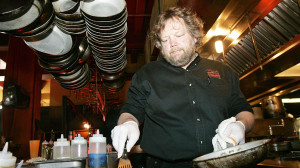Seattle has an explosive new growth of chefs. Seems as if every new Seattle restaurant has an eager wannabe James Beard finalists. … it is getting hard to find a place that just serves a good meal!
As the Washington Post discusses, these elitist chefs need someone to .. well to cook!
“Good cooks are getting harder to come by. Not the head kitchen honchos, depicted in

Seattle’s $15 dollar minimum wge may be hurtung the restaurants ! Why should a Mexican immigrnat work her but off in a steamy, smelly kitchen when she get get $15 working at Walmart? Maybe the restaurants need ot pay MORE that $15 for a cook??? Then my Wago beef burger is gonna cost $20?
Food Network reality shows, who fine-tune menus and orchestrate the dinner rush, but the men and women who are fresh out of culinary school and eager.”
” “It’s gotten to the point where if good cooks come along, we’ll hire them even if we don’t have a position. Because we will have a position,” Paul Kahan, a local chef, told the Chicago Tribune last week.”
“The glitz and glamour of rising through the ranks in the restaurant industry isn’t what it used to be. Long hours, low pay and a series of other cultural and economic factors have made lower-tier restaurant work a much less desirable path than it once was, leaving many kitchens chronically understaffed.
One of the clearest obstacles to hiring a good cook …. is that living in this country’s biggest cities is increasingly unaffordable. In New York, for instance, where a cook can expect to make between $10 and $12 per hour, and the median rent runs upward of $1,200 a month, living in the city is a near impossibility. As a result, people end up living far from the restaurants where they work. Add to that how late dinner shifts can end, causing people to arrive home well into the night.”
So, how come the market is not working? If there is a demand for workers, why isn’t the invisible habve filling the demand?
“The pay just isn’t there,” said Kim McLynn, a representative for industry research firm NPD Group. And .. there is the Mexican problem. Everywhere I go the real workers in the kitchen, illegal or not, are Mexicans. Turns out Mexicans want pay too. ” After years of steady inflows of Mexican immigrants, who have proved both eager and talented cooks, the trend is reversing itself. The number of unauthorized immigrants living in the United States has leveled off over the past decade (it peaked eight years ago in 2007). By 2012, net migration to Mexico was already zero, or even negative, meaning that more Mexicans were moving out than moving in.
That’s terrible news for an industry that has relied on the demographic. In 2010, the Bureau of Labor Statistics estimated that 1.4 million out of a total of about 12.7 million workers in the restaurant industry were immigrants. In 2008, the Pew Hispanic Center estimated that about 20 percent of the country’s more than 2.5 million chefs and cooks were undocumented immigrants.
“I would be surprised if the slowdown in Mexican immigration isn’t responsible for more of the problem than many people realize,” said Tyler Cowen, an economics professor at George Mason University who has written extensively about the economics of restaurants. “This sector is, as anyone in it will tell you, kept afloat by immigrants, especially Latinos.”
READ the full article at the WAPO
